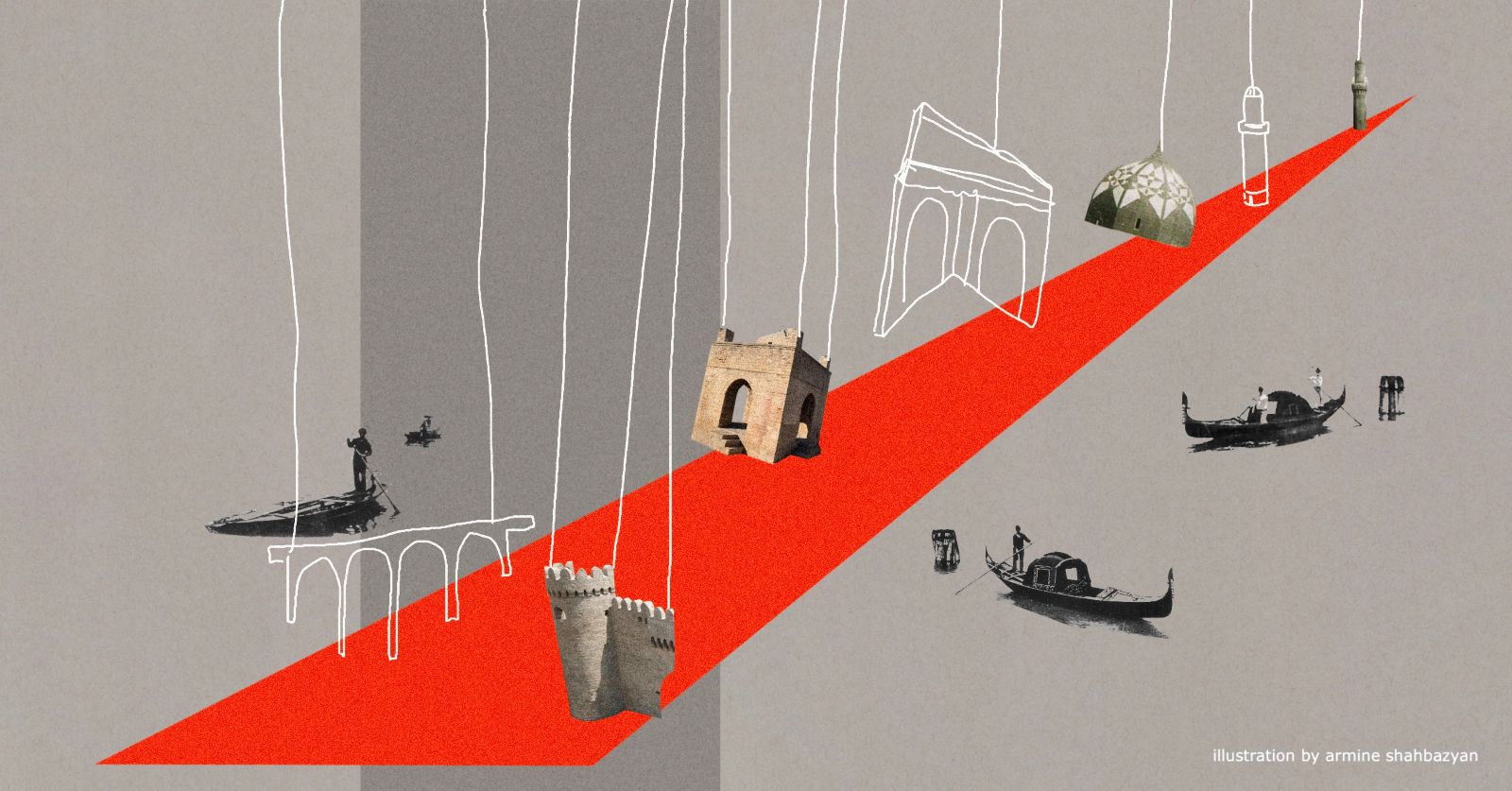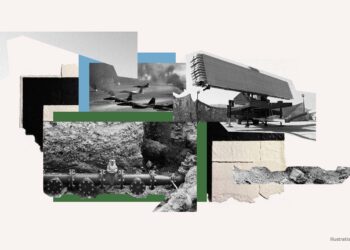
Listen to the podcast.
In recent years, a sophisticated network of individuals and organizations has emerged in Italy, dedicated to advancing Azerbaijan’s narrative in academic and journalistic spheres. This network includes academics, professionals, researchers, and media figures who promote perspectives that align with Azerbaijani interests, often emphasizing historical interpretations that favor Baku.
Through institutional and publication platforms, these advocates seek to reshape discussions about Azerbaijan and its regional conflicts. Their efforts extend beyond the dissemination of information to the strategic framing of narratives that enhance Azerbaijan’s international standing while challenging alternative viewpoints, particularly those rooted in Armenian experience and historical grievances.
This loose public relations network’s emergence raises important questions about its implications on public perception, particularly regarding Armenia, the Nagorno-Karabakh conflict, and Azerbaijani domestic politics. These narratives, permeating academic and media channels, seek to influence how the Italian public, policymakers, and scholars understand these complex issues.
Concerns have been raised that this potentially one-sided information flow could distort perceptions of Armenia’s historical grievances and humanitarian challenges, while misinforming and misleading Italian society.
Azerbaijan’s Lobbying in Italy
For over a decade, Azerbaijan has employed “Caviar Diplomacy”—a strategy using financial incentives, lavish gifts and academic partnerships to build relationships with influential European institutions and public figures.
This approach enhances Baku’s international reputation while undermining dissenting narratives, particularly those from Armenia. Recent Italian and international investigations have revealed a growing network of supporters in Italy, including emerging researchers, established academics, and media figures.
This Italian-based Azerbaijani public relations network, though substantial and occasionally opaque, has come under scrutiny for its activities and staunch support for Baku.
A schematic review of key figures follows:
- Valentina Chabert, a PhD student at La Sapienza University and editor-in-chief of the Italian magazine Opinio Juris – Law & Politics Review, has drawn criticism for advocating the contentious concept of “Western Azerbaijan” at Azerbaijani-organized events. Her involvement sparked controversy, particularly within the Italian-Armenian community, which sent a letter to La Sapienza University seeking clarification about her role in these events. Both the Armenian outlet Aliq Media and the Italian news portal Fai Informazione have published articles questioning Chabert’s credibility, alleging fabricated journalistic credentials and raising concerns about her academic standing. These publications point to a pattern of promoting Azerbaijani narratives while omitting key facts. Although Azerbaijani media have featured her prominently, misrepresenting her as a Doctor of Philosophy from La Sapienza and as a spokesperson for Italian academia, the university has yet to respond publicly or investigate the allegations. The reports also criticize her role in legitimizing state-sponsored narratives that appear originating from and aligned with Baku’s geopolitical messaging.
- Domenico Nocerino, the director of Opinio Juris – Law & Politics Review, has established the magazine as a leading platform for pro-Azerbaijani narratives. Under his leadership, the publication has substantially increased its coverage favorable to Azerbaijan while overlooking humanitarian issues affecting Armenians. Moreover, Nocerino publicly criticized Armenia’s new ambassador to Italy, Vladimir Karapetyan, after the diplomat raised concerns about Valentina Chabert’s involvement in events promoting the controversial concept of “Western Azerbaijan.” Nocerino’s defense of Chabert underscores the magazine’s alignment with Azerbaijani messaging, particularly in support of the “Western Azerbaijan” cause, while accusing the Armenian ambassador of hypocrisy. In recent years, Opinio Juris has published a growing number of articles highlighting Azerbaijani refugee narratives, yet it has remained conspicuously silent on major humanitarian crises, such as the extended blockade of the Lachin Corridor and Azerbaijan’s post-2023 efforts to erase Armenian cultural presence in Nagorno-Karabakh. This form of “Cancel Culture Diplomacy” refers to the systematic suppression, destruction, or denial of Armenian cultural heritage—historical sites, monuments, and symbols—within Azerbaijan and the former territory of Nagorno-Karabakh, aimed at diminishing or erasing the region’s Armenian identity.
- Daniel Pommier Vincelli, currently an assistant professor of International Relations at ADA University in Azerbaijan, previously served as executive director at the Centre for Azerbaijani and Caucasian Studies at Sapienza University. During his tenure, he introduced Azerbaijani history to his bachelor’s and master’s students using sources and narratives closely aligned with official perspectives from Baku. His book, “Susha, Capitale Culturale dell’Azerbaijan” (Susha, Cultural Capital of Azerbaijan) co-authored with Elchin Ahmadov, has drawn criticism from both the Italian and Armenian academic community for its exclusive reliance on Azerbaijani or pro-Azerbaijani sources and lack of balanced perspectives on the region. Recent revelations have further raised concerns about Pommier’s contentious academic approach, particularly his presentations at Italian and international conferences on the alleged phenomenon of “Armenian terrorism” in Italy during the 1960s and 1970s—a narrative widely viewed as an attempt to cast Armenians in a negative light. Taken together, Pommier’s body of work reveals a pronounced pro-Azerbaijani and anti-Armenian bias, calling into question both the scholarly rigor and underlying motivations of his research.
- Simona Scotti, an Italian research fellow at the Topchubashov Centre in Baku, actively promotes Baku–Rome relations through her analyses of security and geopolitical dynamics in international journals, media outlets, and think tanks. Her work frequently centers on Turkey-Azerbaijan relations and EU policies in the South Caucasus, consistently reflecting the Azerbaijani government’s narrative while disregarding Armenia’s historical context and grievances. For example, in an article published in the official magazine and website of the Italian Carabinieri (national police force), Scotti claimed that three decades of Armenian military presence in Nagorno-Karabakh had caused significant environmental damage. The piece focused on Azerbaijani-led restoration efforts but relied solely on Azerbaijani sources and her own work, omitting Armenian perspectives or independent verification.
Implications of Caviar Diplomacy
The formation of this network demonstrates Azerbaijan’s broader strategy to influence international perceptions while discrediting Armenia’s legitimate grievances. The Azerbaijani government has strategically invested in relationships with Italian thought leaders to legitimize its positions and craft compelling narratives.
Recent controversies, especially those involving Chabert, raise ethical concerns about the intersection of academia and lobbying. These events raise questions about integrity in Italian academia and scholars’ roles in public discourse. The Armenian community’s response underscores the urgent need for transparency and accountability from those propagating misleading narratives of a state.
Evidence shows Azerbaijan’s lobbying network is highly active in Italy, with Baku now extending its reach to the Vatican. In early April, the Pontifical Gregorian University in Rome hosted the 12th International Scientific Conference titled “Christianity in Azerbaijan: History and Modernity,” organized by the Azerbaijani Embassy to the Holy See in partnership with various cultural and scientific institutions. The event, which promoted Azerbaijan’s narrative of its Christian heritage, historical significance in Christianity, and commitment to multiculturalism and interfaith dialogue, is misleading. Promotional materials falsely attributed medieval Armenian monuments, such as Dadivank, to the ancient Caucasian Albanian culture, a claim advanced by the Azerbaijani state despite the Albanian kingdom’s dissolution centuries before these structures were built. The Hamazkayin Armenian Educational and Cultural Society’s Central Executive Board published an open letter condemning the conference at the Pontifical Gregorian University, accusing it of enabling Azerbaijan’s misinformation campaign to rewrite history and urging a public clarification and apology.
Conclusion
The Azerbaijani lobbying movement in Italy, led by a coalition of researchers and media professionals, demonstrates a coordinated effort to enhance Azerbaijan’s image while undermining Armenia and its historical and cultural ties with Italy. The activities of Valentina Chabert, Domenico Nocerino, Simona Scotti, and Daniel Pommier demonstrate their use of professional roles to promote Azerbaijan’s interests, raising ethical questions about the integrity of such affiliations.
Through academic events and conferences, these individuals promote Baku’s narrative in Italy and internationally, seeking to influence perceptions of South Caucasus dynamics while discrediting the local Armenian community.
Also see
Part 1
Aliyev’s Fabricated Narratives: Unveiling the Agenda
In this comprehensive article, Sossi Tatikyan examines Azerbaijani President Aliyev’s recent interviews and their implications for Armenia-Azerbaijan relations, juxtaposing his rhetoric with PM Nikol Pashinyan’s responses and broader Armenian perspectives, offering insights and analyses.
Read morePart 2
Aliyev’s Campaign: Aiming to Deter International Support for Armenia
Azerbaijani President Ilham Aliyev’s escalating rhetoric against Armenia aims to justify Baku's coercive tactics, block peace efforts and intimidate international actors. Sossi Tatikyan examines Aliyev's narratives about Western and non-Western powers and their implications for regional stability.
Read moreAzerbaijan’s International Image-Making Strategies and Challenges
Azerbaijan leverages cultural diplomacy, sports, and economic branding to shape its international image. However, human rights abuses, authoritarianism and Armenophobia undermine its efforts, exposing contradictions in the country’s reputation-building strategies.
Read moreHungary: Baku’s Friend in Brussels
Hungary recently blocked EU assistance to Armenia through the European Peace Facility, yet another move highlighting its strategic alignment with Azerbaijan, from supporting Baku's actions in Nagorno-Karabakh to blocking EU statements condemning them to extraditing a convicted murderer more than a decade earlier.
Read moreAzerbaijan-Israel Relations: Implications for Armenia
The deepening alliance between Azerbaijan and Israel carries significant implications for Armenia, notably Azerbaijan's considerable acquisition of advanced Israeli weaponry which it has extensively employed against Armenian forces in the past decade.
Read more





